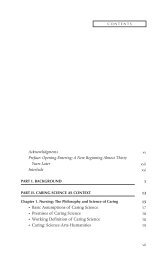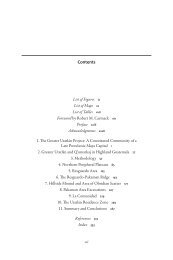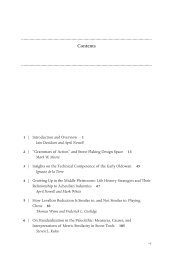free download - University Press of Colorado
free download - University Press of Colorado
free download - University Press of Colorado
You also want an ePaper? Increase the reach of your titles
YUMPU automatically turns print PDFs into web optimized ePapers that Google loves.
Jago Cooper<br />
Understanding Hazards, Mitigating Impacts, Avoiding Disasters<br />
Statement for Policy Makers and the Disaster Management Community<br />
Five thousand years <strong>of</strong> human experience in the Caribbean can provide<br />
important lessons for modern-day policy makers and practitioners working<br />
with the impacts <strong>of</strong> climate change in the region. Case studies in this chapter<br />
show that regional climate change creates unavoidable threats to everyone<br />
living in the islands <strong>of</strong> the Caribbean. However, different communities’ relative<br />
experience <strong>of</strong> these threats is entirely dependent on very local conditions<br />
and the lifestyle choices <strong>of</strong> different societies. The importance <strong>of</strong> the way<br />
local conditions affect the experience <strong>of</strong> environmental hazards highlights<br />
the fact that centralized planning strategies at national or international scales<br />
currently fail to prepare people for what they will experience and how they<br />
should best prepare themselves.<br />
The reliance <strong>of</strong> Precolumbian mitigation strategies on local preparation<br />
for local threats greatly helped reduce vulnerability in the past. This chapter<br />
reveals that the Precolumbian selection <strong>of</strong> secure settlement locations,<br />
the creation <strong>of</strong> diverse food distribution networks, and the use <strong>of</strong> readily<br />
rebuilt household architecture maximized the potential for mitigation<br />
based on local environmental conditions. These Precolumbian lifeways contrast<br />
strongly with modern-day lifestyles in the Caribbean that have been<br />
strongly influenced by non-local European and North American traditions.<br />
Examples such as the colonial legacy <strong>of</strong> European selection <strong>of</strong> river valley<br />
settlement locations or more recent developments, such as the centralized<br />
distribution <strong>of</strong> non-local food staples and the development <strong>of</strong> architectural<br />
designs reliant on imported materials, highlight changes in the Caribbean<br />
that have increased vulnerability to known hazards in the region.<br />
A clear argument arises from this research that the current focus on<br />
short-term “impact” mitigation in the Caribbean is emphasized at the<br />
expense <strong>of</strong> more robust preparation and reconstruction strategies that take<br />
into account the complexity <strong>of</strong> decision-making in human societies and the<br />
need for long-term strategies to change human behavior. Such a lesson shows<br />
the importance <strong>of</strong> local education strategies that try to foster improved traditional<br />
ecological knowledge within communities that helps people understand<br />
the nature <strong>of</strong> the threats they face and feel empowered to plan for<br />
themselves. Both in the past and in the present, the real “cost” <strong>of</strong> an environmental<br />
disaster is <strong>of</strong>ten not from the “event” itself but from the weeks,<br />
months, and years <strong>of</strong> devastation that ensue. The devastating impacts <strong>of</strong> sea<br />
level rise, rainfall change, and hurricane activity are inevitable for modernday<br />
communities in the Caribbean. Therefore this research suggests adopting<br />
the perspective <strong>of</strong> how quickly human communities can return to “life<br />
114





